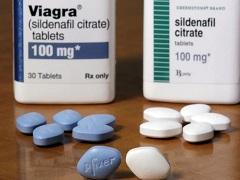British Study Shows That Viagra Can Be Used To Treat COVID-19 Related Pneumonitis And Moderate To Severe ARDS!
Source: COVID-19 Drugs - Viagra - Sildenafil May 18, 2022 2 years, 10 months, 2 weeks, 2 days, 5 hours, 26 minutes ago
COVID-19 Drugs: A new study by researchers from the University College London-UK, Imperial College London and the Royal Brompton Hospital-UK has found that the drug Viagra can be used to treat COVID-19 related pneumonitis and moderate to severe ARDS.

Sildenafil, sold under the brand name Viagra among others, is a medication used to treat erectile dysfunction and pulmonary arterial hypertension.
Many studies and clinical observations have shown that SARS CoV-2 infection is reported to cause pulmonary vascular dysfunction with immunothrombosis, pulmonary embolism, endotheliitis, and neoangiogenesis of larger vessels in patients. These further lead to increased pulmonary vascular resistance, dead space and shunt, as well as right ventricular (RV) dysfunction, which can be improved by therapies that modulate endothelial function.
Some studies have shown that inhalation of nitric oxide (NO) has been identified to have anti-inflammatory, pulmonary vasodilating, along with potential antiviral properties.
Past studies have reported sildenafil which is a phosphodiesterase type 5 inhibitor to increase endogenous NO and is also tolerated by patients with lung fibrosis. However, it can worsen shunt in acute respiratory distress syndrome (ARDS).
The
COVID-19 Drugs study team aimed to determine whether sildenafil could improve gaseous exchange in patients with COVID-19 ARDS with pulmonary hypertension, RV dysfunction, or both.
The study team administered Sildenafil to 25 patients with COVID-19 pneumonitis and moderate to severe ARDS. Oxygenation and carbon dioxide (CO2) clearance were assessed in the patients immediately prior, 24 h, 48 h, and 5 days after sildenafil administration for the calculation of the P: F ratio (PaO2:FiO2), ventilatory ratio, dead space fraction, and oxygenation index.
The study team used norepinephrine equivalents (NE) and the vasoactive-inotropic score (VIS) to calculate the vasoactive drug dose.
For the study, initially, sildenafil was administered at 12.5 mg three times a day, increasing to 25 mg if it was well tolerated. Finally, the patients underwent baseline and follow-up CT scanning and detailed echocardiographic assessment.
The study findings indicated that out of the 25 patients, 10 were on venovenous extracorporeal membrane oxygenation (VV-ECMO) and 11 were prone. Pulmonary hypertension, RV dysfunction, or both were detected at baseline in all patients. One patient was removed from sildenafil before ICU discharge, while 24 continued it for 12.7 days at 25 mg three times a day.
The study findings indicated an increase in NE and VIS 24 hours following initiation of sildenafil therapy. The dose of norepinephrine was increased in 14 patients, decreased in 10 patients, and remained unchanged for one patient. HR and MAP were found to be stable 24 h after sildenafil. Moreover, the P: F ratio was observed to increase in non-ECMO patients 24 h after sildenafil while dead space and ventilatory ratios remained unchanged.
It was noted that pulmonary embolism was detected in 17 patients in baseline CT scans, while a reduction in pulmonary artery (PA) volume and the right atrial area was observed in follow-up CT scans.
&l
t;br />
The study team noted that a decrease in brain natriuretic peptide (BNP) and hs-troponin was observed from before sildenafil to a 1 to 2-day time point for troponin or a 1 to 7-day time point for BNP. Additionally, pulmonary vascular resistance was reported to decrease, and LV cardiac output was reported to increase during the follow-up period.
It was reported that nine patients (four ECMO recipients) died in the ICU, a 36% mortality rate. After the last follow-up, 12 out of 13 patients had normal echocardiography, four had mild parenchymal changes, and one was observed to have a persistent perfusion defect.
Hence the study findings determine that sildenafil is safe in carefully selected COVID-19 ARDS patients. No deterioration in oxygenation, hemodynamics, or dead space was observed. Moreover, sildenafil also did not deteriorate gaseous exchange. However, the role of sildenafil in the longer-term improvement in lung impairment is yet to be seen.
The study findings were published in the peer reviewed British Journal of Anaesthesia.
https://www.bjanaesthesia.org/article/S0007-0912(22)00186-6/fulltext
For the latest on
COVID-19 Drugs, keep on logging to Thailand Medical News.
